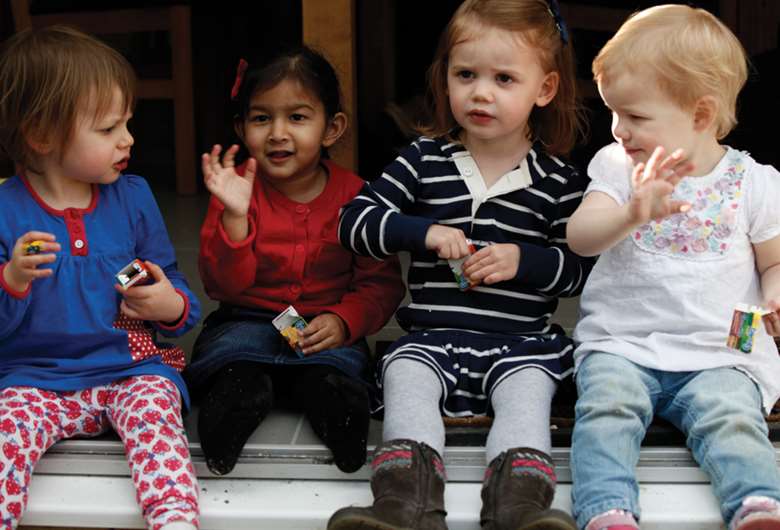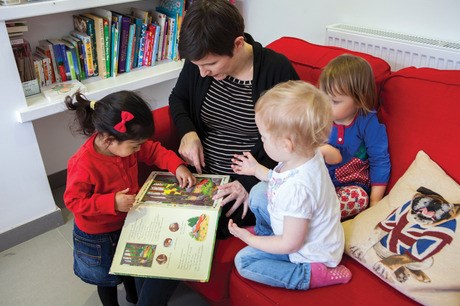Learning & Development: Communication & Language - On Platform 3
Sue Owen
Monday, November 30, 2015
A pilot online training programme building nursery practitioner confidence with children’s language needs is being extended to childminders. Sue Owen looks at what it offers

Communication is a fundamental life skill, and its importance in early childhood has been well-evidenced. Language development at age two can often predict children’s performance on entry to primary school, while children with poor language skills at five are at a substantial risk of low achievement at seven and beyond.
In his 2006 review of early reading, Sir Jim Rose notes, ‘The development of speaking and listening skills requires fuller and more intensive attention to make sure that children acquire a good stock of words, learn to listen attentively, and speak clearly and confidently... they are prime communication skills, hugely important in their own right and central to children’s intellectual, social and emotional development.’
However, research also shows that many early years practitioners lack confidence in their ability to meet children’s speech and language needs and struggle to acquire the training and support they need.
To address this problem, The Communication Trust developed an online training platform to deliver the accredited Level 3 award Supporting Children and Young People’s Speech, Language and Communication. Now the trust has teamed up with early years organisation PACEY, a CACHE-registered centre, to extend ‘Platform 3’ to childminders. The course comprises 68 guided learning hours and is assessed through online written tasks and an observation in the setting.
Extending the training to childminders seemed pressing due to the introduction of the Early Years Pupil Premium (EYPP) and the extension of funded places to disadvantaged two-year-olds. These children are more likely to be found in disadvantaged areas, where only 64 per cent of childminders are achieving ‘good’ or ‘outstanding’ Ofsted grades. Many childminders also lack early years qualifications, while their working patterns make it difficult for them to attend daytime face-to-face courses.
One hundred childminders from across England are now halfway through a pilot, funded by the Department for Education (DfE). The demand for the free pilot places was high, with applications exceeding availability by two to one, but priority was given to those accessing the EYPP and delivering the two-year-old offer.
PLATFORM 3
The aim of the original project was to develop an accessible, cost-effective route for early years practitioners from a wide range of backgrounds to gain a robust Level 3 award in supporting children’s communication and language development.
Improvements were seen in individuals’ practice and the quality of language learning environments
- The DfE funded a two-year pilot as developing a model of online tutor support and assessment fitted with its aim to upskill the early years workforce and its wider goals to:
- bridge the language development gap between ‘advantaged’ and ‘disadvantaged’ children
- improve speech, language and literacy levels at primary school level, and
- ensure early identification of special educational needs (a particular advantage of the award is its emphasis on identification of speech and language delay in young children and the ways in which providers can implement the special educational needs and disability reforms).
EVALUATION
The evaluation of the pilot (2013-15) showed a marked improvement in all three areas targeted by the award.
The quality of early years speech, language and communication (SLC) provision
The confidence and knowledge of practitioners increased, with significant improvements in the quality of individuals’ practice and also improvements in the quality of settings as language learning environments. Particularly significant were the improvements in two specific areas: demonstrating/modelling rather than criticising, and using language at roughly the same level as the child.
An example are these before and after observations on a provider’s practice:
‘Amy tended to over-talk, rather than giving the children time to initiate interaction. She also asked too many questions, rather than making comments.’ But after the qualification: ‘Amy allowed the children time to respond and gave them the opportunity to initiate their own conversations with her... when children began discussing their home stories, Amy responded and extended on what the children were telling her.’
Practitioners’ effectiveness in working with children to support their SLC
Outcomes were particularly positive for those practitioners taking the optional unit on working with parents and carers, and practitioners also became more likely to use formal records to support children’s progress checks.
One participant noted, ‘I now feel more informative and confident and can pass on resources (the same that are used in the setting) for parents to use at home.’
Early identification of children with delayed SLC and effective use of the Progress Check at Age Two
The largest increase in confidence and skills related to practitioners’ knowledge of typical SLC and their ability to support children who were struggling. More than 98 per cent of learners reported that they now felt more knowledgeable, skilled and confident in this area. There was also a significant increase in confidence in using the Progress Check at Age Two as a basis for structuring discussions with parents and other professionals.
One noted, ‘I now have a broader knowledge of what to look for and where a child’s expected age and stage of development should be... now I feel I can explain how this links with other areas of development more clearly too.’
Content and presentation
Additionally, over 90 per cent of the pilot group rated the content and presentation of the online learning materials as good or excellent and 95 per cent were happy with the quality of work they produced. The main benefit of the online model was judged to be its flexibility and the chance for practitioners to fit study around their work and family commitments.
Some valuable lessons were also learned about ease of use and navigation of online materials and the type of support needed from the tutors attached to the assessment centres. For example, while 65 per cent of the pilot group successfully completed the award, this rose to over 90 per cent for the learners attached to one of the assessment centres, so the type of support offered by that centre has been a model for the current developments.
The childminder pilot is also being evaluated.

SIGN UP NOW
The Communication Trust is moving ahead with plans to ensure that this valuable award is sustainable in the future for providers in all early years settings. As Cathy Nutbrown told Nursery World in March 2014, ‘The quality of the experiences offered to the youngest children depends greatly on the quality of the staff working with them, and robust qualifications is one way to ensure that staff are well equipped to do this important work.’
Training providers are now signing up to offer the award and employers are being encouraged to make it available to their staff so that no one needs to miss the training on Platform 3.
WHAT DOES THE GOVERNMENT SAY?
In a 2011 report, the Government highlighted recent research into SLC in the early years and argued for this to be a priority area for providers: ‘Language development at age two is very strongly associated with later school readiness, with the early communication environment in the home providing the strongest influence on language at age two – stronger than social background.
‘There is clear evidence that enabling children to develop their speech, language and communication skills at an early stage makes an enormous difference, and helps reduce the incidence of special educational needs. Children who start school as confident speakers with good language skills become successful learners and achieve in life... Evidence from statutory assessments at age five shows that the lowest achievements are in early communication, language and literacy, with low income children behind their high income counterparts at school entry by 16 months in vocabulary.’
Supporting Families in the Foundation Years (DfE and DoH, 2011) can be downloaded from www.education.gov.uk/publications
MORE INFORMATION
Development in the Early Years: its importance for school performance and adult outcome, A Fernstein and K Duckworth (2006)
Evaluation of the original Platform 3 pilot, www.thecommunicationtrust.org.uk/platform3evaluation
For training providers offering Platform 3, visit www.platform3 online.org.uk or email enquiries@thecommunication trust.org.uk
Independent Review of the Teaching of Early Reading, J Rose (2006), DfES
Investigating the Role of Language in Children’s Early Educational Outcomes research report, Roulstone et al (2001), DfE RR 134
PACEY, www.pacey.org.uk
Sue Owen is an independent researcher and consultant on childminding




